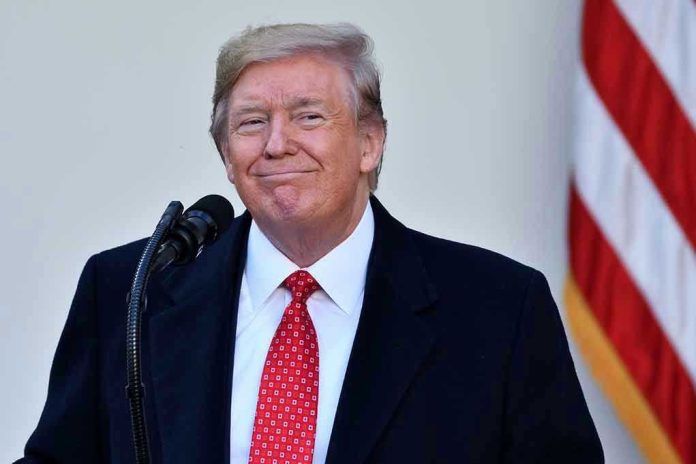
Democratic governors are fiercely condemning Trump’s federal crime crackdown, yet Vice President JD Vance says their outrage over federal intervention far exceeds their concern for rampant crime—raising critical questions about whose interests truly come first.
Story Snapshot
- President Trump authorized a federal crime emergency in Washington, DC, deploying the National Guard and federal agents.
- Democratic governors denounce the intervention as a political stunt undermining local authority, sparking heated debate.
- JD Vance challenges Democrats, asking why they oppose federal action more than the crime itself.
- Over 600 arrests reported since the crackdown began, with potential expansion to other Democrat-led cities.
Trump’s Federal Crackdown on Crime Sparks Fierce Political Battle
President Donald Trump declared a crime emergency in Washington, DC, authorizing the deployment of National Guard troops and federal agents to target surging violent crime and vehicle theft rates. The administration signaled plans to expand this intervention to other Democrat-led states and cities, positioning the crackdown as a decisive response to years of escalating lawlessness. This move ignited a political firestorm, with Democratic governors alleging the operation is driven by presidential politics rather than public safety, and that it represents an unprecedented federal intrusion into local law enforcement. The deployment has already resulted in more than 600 arrests, bringing immediate, visible changes to the capital’s streets.
Vice President JD Vance, one of the most vocal defenders of the crackdown, has directly confronted critics both in media and on the streets of DC. During a visit, Vance was heckled by protesters but stood firm, arguing that Democratic leaders are angrier about federal intervention than the underlying crime crisis itself. He questioned the motivations behind Democratic opposition, suggesting that political considerations and resistance to federal authority outweigh concern for public safety. Vance’s public stance has galvanized conservative supporters, many of whom see the administration’s aggressive approach as a long-overdue correction to years of perceived neglect and soft-on-crime policies in major urban centers.
Democratic Governors Push Back, Claim Federal Overreach
Democratic governors including Gavin Newsom, JB Pritzker, and Wes Moore have strongly condemned the federal intervention, claiming it undermines state sovereignty and local governance. They argue that the crackdown is a thinly veiled effort to damage Democratic candidates ahead of the 2028 election, rather than a genuine attempt to address public safety. Washington, DC Mayor Muriel Bowser and Metropolitan Police Chief Pamela Smith have also voiced opposition, asserting that local reforms are delivering results and that federal involvement is unnecessary. Bowser stated, “Crime has gone down in our city… those are the facts,” while Smith acknowledged federal agents have been helpful but stressed the importance of local control. This dispute highlights a fundamental clash over federal versus local authority—a tension with deep roots in American constitutional principles.
The Trump administration is leveraging the crime issue to paint Democratic rivals as ineffective and unconcerned with the safety of their constituents. Trump and Vance have tied the crackdown directly to the upcoming presidential race, suggesting that Democratic resistance to law enforcement intervention will “sully the records” of their future opponents. This explicit political framing has further fueled accusations that the operation is more about optics and electoral advantage than substantive crime reduction.
Impact on Law Enforcement, Community, and the 2028 Election
Since the federal takeover began, law enforcement activity in Washington, DC has surged, with over 600 arrests reported and a visible increase in police presence. The National Guard and federal agencies are operating alongside local police, creating new operational dynamics and tensions. Local communities are divided—some welcome the crackdown as a necessary step to restore order, while others fear over-policing, civil liberties violations, and erosion of local autonomy. Public protests against the intervention have drawn national media attention, with demonstrators confronting federal officials and demanding respect for local governance.
Vance questions why Democrats are angrier about Trump’s plan to tackle crime than crime itself https://t.co/3mSCjhC0cE
— Observing Time 🏴☠️ (@TimeObserving) August 26, 2025
Expert analysis reveals deep uncertainty about both the necessity and effectiveness of federal crime crackdowns. Law enforcement professionals note that while federal resources can bolster local efforts, coordination is critical to maintaining public trust. Political analysts emphasize the unprecedented nature of the intervention and its clear electoral motivations. Criminal justice scholars warn that history offers mixed evidence on the long-term impact of federal crackdowns, with risks to civil liberties and community relations. The ongoing controversy is likely to shape the narrative of the 2028 presidential race, as both sides seek to define the future of crime policy, government authority, and constitutional values.
Sources:
Trump and JD Vance Attack 2028 Rivals in National Guard Push
Declaring a Crime Emergency in the District of Columbia
Protesters heckle Vance, Hegseth, Miller photo op in DC







